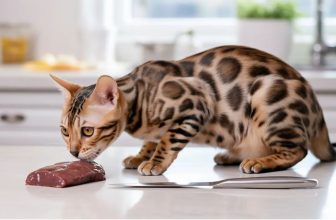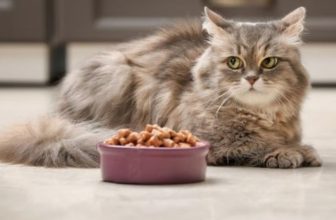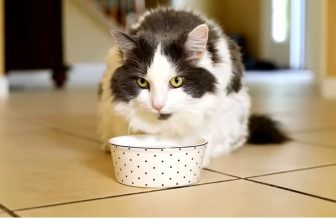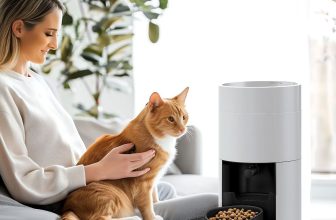What Human Food Can Cats Eat Every Day-The Best Guide

1. What Human Food Can Cats Eat Daily?
Cats are obligate carnivores, meaning their diet should primarily consist of meat. However, some human foods can complement their diet when given in moderation. Here’s a breakdown of safe options:1.1 Protein-Rich Foods
Chicken Chicken is a fantastic source of protein for cats, provided it’s cooked properly. Boiled or baked chicken (without seasoning, bones, or skin) is easy for cats to digest and packed with essential nutrients. Avoid fried or heavily seasoned chicken, as these can upset your cat’s stomach. Turkey Like chicken, turkey is a lean meat option that’s safe for cats. Cooked, unseasoned turkey can be a great addition to your cat’s diet. Just make sure to remove any bones and skin before serving. Liver (in moderation) The liver is nutrient-dense and can be a healthy treat for cats. It’s rich in vitamins A and B, iron, and protein. However, too much liver can lead to vitamin A toxicity, so it should only be given occasionally and in small amounts.
1.2 Fish (But with Caution)
Salmon Salmon is packed with omega-3 fatty acids, which are beneficial for your cat’s skin and coat. However, it should always be cooked and served in moderation. Raw salmon can contain parasites and bacteria that are harmful to cats. Tuna While cats love the taste of tuna, it should only be given as an occasional treat. Tuna can lead to mercury build-up if fed too often, and it lacks some essential nutrients that cats need for a balanced diet.1.3 Cooked Eggs
Eggs are an excellent source of protein and amino acids for cats. They should always be cooked to avoid the risk of salmonella. Scrambled or boiled eggs (without salt, butter, or oil) are a safe and nutritious option.1.4 Dairy Products (Only in Moderation)
Cheese Cheese can be a tasty treat for some cats, but it should be given in small amounts. Many cats are lactose intolerant, so monitor your cat for any signs of digestive upset after feeding them cheese. Plain Yogurt Plain, unsweetened yogurt can be safe for cats in small quantities. It contains probiotics that may benefit their digestive system. However, like cheese, it should be given sparingly, as many cats struggle to digest dairy.1.5 Fruits and Vegetables (In Small Amounts)
Blueberries Blueberries are rich in antioxidants and can be a healthy snack for cats. They should be given in small portions and washed thoroughly to remove any pesticides. Carrots Cooked or raw, carrots can be a safe and crunchy treat for cats. They’re low in calories and high in fiber, making them a good option for cats who enjoy vegetables. Pumpkin Pumpkin is excellent for digestive health, especially if your cat has tummy troubles. Plain, cooked pumpkin (not pumpkin pie filling) can help regulate digestion and is a great source of fiber.
2. What Human Food Can Cats Eat as a Treat?
While some human foods can be part of your cat’s daily diet, others are better suited as occasional treats. Here are some safe options:2.1 Catnip
Catnip is a safe and fun treat for most cats. It can be used to encourage play or as a reward. Not all cats react to catnip, but for those that do, it’s a great way to add some excitement to their day.2.2 Lean Poultry
Cooked chicken or turkey morsels make excellent treats for cats. They’re high in protein and low in fat, making them a healthy option for rewarding your feline friend.2.3 Cheese
As mentioned earlier, cheese can be a tasty treat for cats, but it should only be given occasionally. Stick to small amounts and avoid cheeses with added flavors or spices.2.4 Plain Rice Cakes or Plain Popcorn
Plain rice cakes or unsalted, unbuttered popcorn can be a low-calorie treat for cats. These should only be given in small amounts and as an occasional snack.
3. What Human Food Should Cats Never Eat?
While some human foods are safe for cats, others can be extremely dangerous. Here’s a list of foods to avoid at all costs:3.1 Dangerous Foods
Chocolate Chocolate contains theobromine, which is toxic to cats. Even small amounts can cause vomiting, diarrhea, seizures, or even death. Onions and Garlic Onions and garlic, in any form (raw, cooked, or powdered), can damage a cat’s red blood cells, leading to anemia. Avoid these ingredients entirely. Grapes and Raisins Grapes and raisins can cause kidney failure in cats. Even a small amount can be dangerous, so keep these foods far away from your feline friend. Caffeine Caffeine can cause severe issues like heart palpitations, restlessness, and even death in cats. Keep coffee, tea, and energy drinks out of reach. Alcohol Alcohol is never safe for cats. Even a small amount can cause intoxication, liver damage, or death. Bones Bones pose a choking hazard and can cause internal injuries or blockages. Always remove bones from meat before feeding it to your cat.
4. What Canned Human Food Can Cats Eat?
If you’re considering sharing canned human food with your cat, here are some safe options:4.1 Low-Sodium Broth
Low-sodium chicken or beef broth can be a tasty addition to your cat’s diet. It’s a great way to add moisture to their food, especially if they’re not drinking enough water.4.2 Plain Rice or Pasta
Plain, cooked rice or pasta can be safe for cats in small amounts. These can be helpful if your cat has an upset stomach, but they shouldn’t replace their regular diet.4.3 Fish (Cooked, Not Raw)
Cooked fish, such as salmon or tuna, can be a good source of protein and omega-3 fatty acids. Avoid raw fish, as it can contain harmful bacteria and parasites.4.4 Vegetables (Cooked Only)
Cooked vegetables like peas and carrots can be safe for cats in small amounts. They provide fiber and nutrients, but they should never make up a large portion of your cat’s diet.4.5 Cottage Cheese
Cottage cheese can be a good occasional snack for cats, but it’s not suitable for every cat. Some cats may struggle to digest dairy, so monitor your cat for any signs of digestive upset.
Frequently Asked Questions: What Human Food Can Cats Eat Every Day?
Q1: What Human Food Can Cats Eat Every Day?
A1: Cats can safely eat cooked lean meats like chicken, turkey, and beef daily. Small portions of cooked fish are also acceptable. Avoid onions, garlic, and excessive fat. Always consult a vet for personalized advice.
Q2: What Can I Feed My Cat When I Run Out Of Cat Food?
A2: Cooked meats like chicken, turkey, and lean beef can replace cat food temporarily. Steamed vegetables and plain rice are also safe options. Always avoid onions, garlic, and spices. Consult a vet for long-term feeding.
Q3: What Human Food Can Replace Cat Food?
A3: Cats often love tuna, chicken, and cooked fish, which are rich in protein and appealing to their taste buds. Always ensure these foods are safe and appropriate for your pet.
Q4: What Human Food Can Replace Cat Food?
A4: Yes, cooked eggs are safe and provide protein. Serve them plain and in small portions.
Q5: Can Cats Have Low-sodium Canned Fish Regularly?
A5: In moderation, low-sodium canned fish like tuna or salmon can be part of a cat’s diet.







